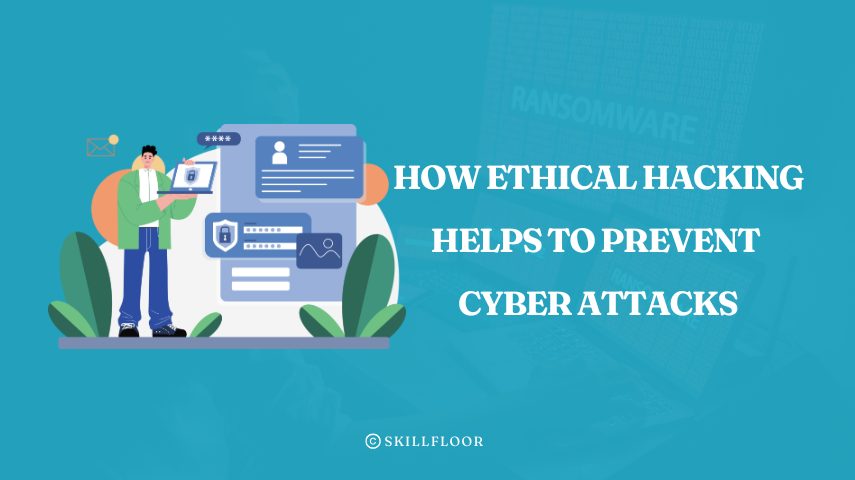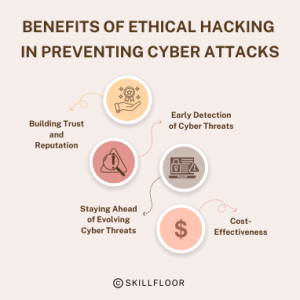As an ethical hacker, my primary goal is to help organizations strengthen their security by identifying vulnerabilities before malicious hackers can exploit them. Ethical hacking involves testing and probing systems, networks, and applications to find weaknesses in a controlled, legal way. By mimicking the techniques used by cybercriminals, I can uncover hidden threats, weak points, and flaws in a company’s defenses, enabling them to patch these vulnerabilities before they lead to a breach.
Preventing cyberattacks is more critical than ever, and ethical hacking plays an important role in this process. With cyber threats becoming increasingly sophisticated, relying on traditional security measures alone may not be enough. Through ethical hacking, I can provide real-world testing that reveals how well a system can withstand actual attacks. This proactive approach allows businesses to stay one step ahead of hackers, minimizing the risk of data loss, financial damage, and reputational harm.
What is Ethical Hacking?
Ethical hacking is the practice of intentionally probing a system, network, or application for weaknesses, with the goal of fixing those flaws before they can be used by malicious hackers. It’s called “ethical” hacking because it is done legally, with permission, and to improve security not to cause harm. Ethical hackers are often hired by organizations to test their security measures and provide solutions for areas of weakness.
There are several types of ethical hacking, but the main ones include:
- Penetration Testing (Pen Testing): This is where ethical hackers attempt to break into a system using the same techniques as a hacker would. They might try to exploit known vulnerabilities or attempt to bypass security controls.
- Vulnerability Assessment: This involves scanning systems for potential weaknesses, identifying areas where security is lacking, and suggesting improvements.
- Social Engineering Testing: Ethical hackers might attempt to manipulate employees into revealing confidential information (like passwords) or clicking on malicious links to test how vulnerable a company is to attacks that target human error (e.g., phishing).
How Ethical Hacking Prevents Cyber Attacks
Now let’s explore exactly how ethical hacking helps prevent cyberattacks. Here are the key ways in which it contributes to a stronger, more secure environment:
- Identifying Vulnerabilities Early:
One of the most important roles of an ethical hacker is to identify vulnerabilities before anyone else does. Vulnerabilities are weaknesses or flaws in a system, network, or application that can be exploited by malicious hackers. These vulnerabilities could be anything from outdated software and unsecured passwords to misconfigured firewalls or loopholes in code.
For example, if a company uses outdated software that has a known security vulnerability, hackers could potentially exploit it to gain access to the company’s internal network. Ethical hackers can find such weaknesses and help the company fix them before a cybercriminal takes advantage of them.
Identifying vulnerabilities early is important. The sooner these weaknesses are discovered, the less time hackers have to exploit them. This can save businesses from costly data breaches, loss of sensitive information, and damage to their reputation. - Simulating Real-World Attacks:
Ethical hackers don’t just look for vulnerabilities; they also test how well a system can stand up to real-world cyberattacks. They do this by simulating attacks that are likely to occur, such as phishing, brute-force login attempts, or malware.
One common test is penetration testing (pen testing), where ethical hackers attempt to break into a system in the same way a real hacker would. This could involve trying to bypass firewalls, exploit vulnerabilities, or use stolen credentials. When an ethical hacker successfully accesses the system, they can pinpoint exactly where the defenses are weak and make recommendations to fix those issues.
By simulating real attacks, ethical hackers help organizations understand how well their security measures hold up under pressure. If the system can withstand these simulated attacks, it is far more likely to be secure when faced with a real threat. - Strengthening Security Measures:
Ethical hackers don’t just find vulnerabilities; they also help strengthen the security measures that are already in place. This could mean improving existing firewalls, intrusion detection systems, data encryption, or access controls.
For example, an ethical hacker might identify that a company’s firewall isn’t configured properly, leaving the network exposed. They can suggest improvements, like setting up intrusion detection systems that can spot unusual activity or unauthorized access attempts, or encrypting sensitive data to prevent it from being stolen even if it’s intercepted.
The key benefit here is that businesses can stay ahead of hackers. By constantly testing and updating security measures, companies can prevent cybercriminals from gaining access to their systems.
Benefits of Ethical Hacking in Preventing Cyber Attacks
There are numerous benefits to implementing ethical hacking as part of your cybersecurity strategy.
- Early Detection of Cyber Threats:
Ethical hacking helps businesses detect potential threats early, long before they can turn into full-blown cyberattacks. The earlier you find a vulnerability, the easier (and cheaper) it is to fix. By conducting regular security tests, ethical hackers give organizations a head start in securing their systems before hackers have a chance to strike.
For instance, an ethical hacker might uncover an unpatched software vulnerability that could allow hackers to take control of a server. If this issue is found early, the company can patch the software before hackers can exploit it. - Cost-Effectiveness:
The cost of a cyberattack can be massive. A data breach might result in millions of dollars in damages, legal fees, and fines for non-compliance with data protection laws. On top of that, companies might lose customers’ trust, leading to even greater losses in revenue.
In contrast, ethical hacking is a relatively low-cost investment that can prevent these kinds of financial setbacks. For example, by finding vulnerabilities before attackers can exploit them, businesses avoid costly breaches and the associated financial, legal, and reputational damage. - Building Trust and Reputation:
Customers today are more aware than ever of the risks of cybercrime and data breaches. A business that invests in ethical hacking and shows customers that it takes data protection seriously is likely to build trust and improve its reputation. Many customers are more likely to do business with a company that can prove it actively works to protect their data.
For example, a company that hires ethical hackers and publishes regular security reports may attract more customers who value privacy and security. They’ll feel more confident knowing the business is actively working to protect their information. - Staying Ahead of Evolving Cyber Threats:
Cybercriminals are constantly evolving their tactics, and the methods that worked yesterday might not be effective tomorrow. Ethical hackers stay on top of the latest security trends and hacking techniques. By regularly testing systems and staying updated on new threats, businesses can ensure their defenses are always one step ahead of hackers.
Ethical hackers can adapt to new threats and offer solutions to help businesses maintain strong security even as the landscape changes. Without this continuous testing and updating, companies risk falling behind and becoming vulnerable to newer types of attacks.
Challenges Ethical Hackers Face
While ethical hacking is crucial for protecting systems, it does come with some challenges:
- Legal and Ethical Constraints: Ethical hackers must always work within the law and adhere to strict ethical guidelines. They must have written permission from the organization to test systems, and they must be careful not to cause unintended harm during the testing process.
- Staying Up to Date with New Threats: Cybersecurity is a fast-paced field. Hackers are always coming up with new techniques, so ethical hackers must stay informed about the latest threats and hacking methods. This requires ongoing learning, research, and keeping up with new security tools.
- Balancing Thoroughness with Time Constraints: Ethical hackers must be thorough in their testing but also need to work within time limits. While testing every possible weakness is ideal, it’s not always practical, especially when dealing with complex systems or large networks.
Ethical hacking plays an important role in preventing cyberattacks by helping organizations identify and fix security vulnerabilities before malicious hackers can exploit them. By simulating real-world attacks, ethical hackers uncover weaknesses in systems, networks, and applications, allowing businesses to strengthen their defenses and protect sensitive data. This proactive approach not only helps prevent costly breaches but also builds trust with customers and ensures that security measures stay ahead of evolving cyber threats. Ultimately, ethical hacking is an essential tool in the digital world for keeping systems secure and minimizing the risk of cybercrime.

